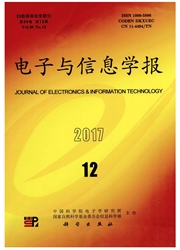

 中文摘要:
中文摘要:
利用包含信道质量的反馈信息,多用户分集能显著提高无线通信系统的性能。然而,在多载波多天线(MIMO—OFDM)的架构下,反馈所有用户的所有信道质量信息(CQI)将占据大量的无线资源,从而降低了频谱效率,因此各种有限信道反馈算法被提出来减少系统的反馈开销。该文主要研究了基于两种典型的有限信道反馈的多用户分集增益,并与理想反馈进行了对比。系统平均频谱效率数学表达式的推导考虑了可选调制方式有限的特性,更符合实际。仿真用于评估各种反馈算法下的多用户分集性能,其结果与理论分析相当匹配。并且只要恰当地选取反馈参数,有限信道反馈算法可以在不损失多用户分集增益的前提下,极大的降低反馈开销,这为设计实际系统的信道反馈提供了参考。
 英文摘要:
英文摘要:
Multiuser diversity can significantly improve wireless communication system performance by exploiting the feedback information that conveys the channel quality. In Multiple Input Multiple Output-Orthogonal Frequency Division Multiplexing(MIMO-OFDM) structure, the per subcarrier of per user feedback expenses a substantial amount of wireless resource and decreases spectrum efficiency, so various limited channel feedback scheme is proposed to reduce the feedback load. In this paper, the multiuser diversity gain based on two representative limited channel feedback is investigated, and it is compared with ideal feedback. The close-form expression of average spectrum efficiency is deduced with considering a discrete finite set of candidate constellation sizes for practical system. Extensive simulations are presented to evaluate the multiuser diversity performance in various feedback scheme and the results match with the numeral analysis very well. The limited feedback schemes can reduce the feedback load greatly with no loss in terms of multiuser diversity gain only if the feedback parameters are chosen properly, which provides the instruction to design the channel feedback of practical system.
 同期刊论文项目
同期刊论文项目
 同项目期刊论文
同项目期刊论文
 期刊信息
期刊信息
